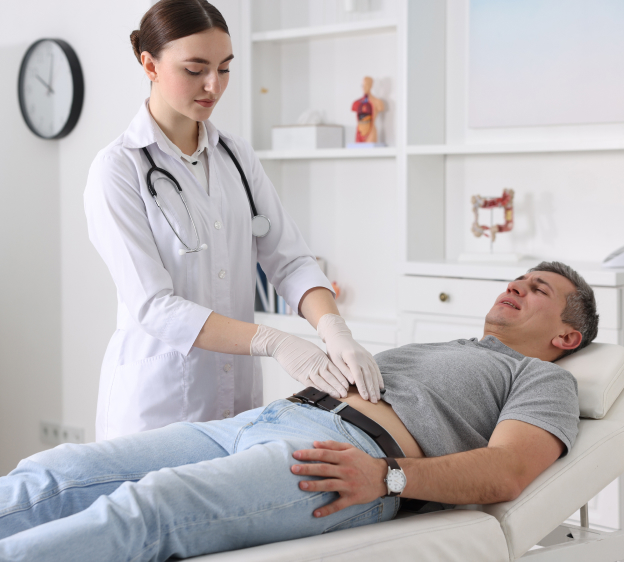Bladder Cancer and Smoking: Understanding the Connection
June 11, 2025Categories: Cancer Care, Urinary & Kidney

Smoking can cause problems anywhere in your body, including your bladder. In fact, the American Cancer Society reports that smoking triples your risk of developing bladder cancer and causes nearly one out of every two cases.
“It’s mind-blowing that a simple lifestyle change could cut the number of bladder cancer diagnoses in half,” says Dr. J. Eric Turner, board-certified and fellowship-trained medical oncologist with Beaufort Memorial Oncology Specialists. “Of course, it’s also encouraging, as it may be the information you need to finally put down cigarettes for good.”
Learn how smoking affects your likelihood of being diagnosed with bladder cancer, what you can do about it and what screening options you have to detect it early.
Read More: Can Vaping Cause Lung Cancer? What We Know So Far
How Smoking Causes Cancer
Every time you smoke a cigarette, you inhale thousands of chemicals, dozens which are known to cause cancer. These chemicals then travel throughout your body through your bloodstream and urine.
When chemical-filled urine pools in your bladder, the chemicals encounter the cells there. These chemicals may then damage the DNA of bladder cells, causing the cells to grow out of control. That out-of-control growth is bladder cancer.
However, chemicals from cigarettes don’t just affect the bladder. They can damage cells and cause cancer in any body part. Other cancers that smoking may cause include:
- Blood cancer
- Colorectal cancer
- Kidney cancer
- Lung cancer
- Pancreatic cancer
- Stomach cancer
Additionally, smoking causes many noncancerous conditions in men and women alike. These include Type 2 diabetes, heart disease, rheumatoid arthritis and chronic obstructive pulmonary disease (COPD). Quitting smoking reduces your risk for all these and more.
Read More: The Top 5 Reasons to Quit Smoking
Reducing Your Risk for Bladder Cancer
“With such a strong link between smoking and bladder cancer, it’s essential to stop smoking as soon as possible,” Dr. Turner says. “Stopping is the primary step I recommend to lower your risk of bladder cancer diagnosis.”
Of course, it can be difficult to stop smoking. Every cigarette contains nicotine, an addictive substance that makes your body crave more. Despite this, many people put cigarettes in their past.
If you have a hard time not smoking, these steps from the Centers for Disease Control and Prevention may help you quit cigarettes, once and for all.
- Curate your environment. If you’re serious about quitting, get rid of all your cigarettes and lighters and wash your clothes. The goal is to get rid of anything or any smell that may remind you of smoking and tempt you to light another cigarette.
- Have a plan. Hard times will come during your quitting journey. Your brain will insist that you can get away with just one more cigarette. Know what environments and other triggers make you want a cigarette and avoid them as often as possible. When you can’t escape your desires, distract yourself. Call a friend, eat a carrot, take a walk or write a poem.
- Medicate your urges. “It’s impossible to quit smoking unless you want to quit,” Dr. Turner says. “However, you don’t have to rely on willpower alone anymore.” Nicotine replacement patches, lozenges and gum can take the edge off your cravings. By using them as directed, you can move toward a smoke-free you.
To further lower your risk, eat a healthy diet with plenty of fruits and vegetables and drink lots of water every day.
Read More: How to Stop Smoking for Good
Signs That You Have Bladder Cancer
Unfortunately, you can’t eliminate your risk for bladder cancer altogether. Therefore, it’s important to recognize the symptoms and seek medical attention.
Some cases of bladder cancer cause no symptoms during the earliest stages. When symptoms arise, they typically involve problems with urination. Symptoms you may experience include:
- Blood in the urine that occurs sporadically or consistently
- Burning sensation or pain when urinating
- Need to urinate frequently in the daytime or nighttime, possibly even if your bladder is not full
As the cancer progresses, your symptoms may extend beyond the bladder. As a result, your cancer may cause the following:
- Abdominal pain
- Back pain on one side of the back
- Bone tenderness or pain
- Fatigue
- Foot swelling
- Weight loss for no known reason
Screening to Detect Cancer in Your Bladder
Screening can detect cancer before you notice symptoms, but it’s not for everyone. Currently, bladder cancer screening candidates are those at higher risk of bladder cancer. That includes people who smoke. If you smoke, your healthcare provider may recommend one or more different screenings.
Tests that help lead to a cancer diagnosis include the following:
- Cystoscopy — Your urologist guides a thin, flexible tube (cystoscope) through the urethra to your bladder. A tiny camera on the end of the cystoscope allows the urologist to visualize abnormalities. The urologist may then remove tissue samples for laboratory testing, a procedure known as a biopsy.
- Hematuria testing — A sample of your urine undergoes evaluation in a laboratory setting. The goal is to determine if there is any blood in your urine, which may indicate cancer.
- Urine culture — This screening helps differentiate between bladder cancer and a bladder infection. With this test, your urine sits in the laboratory for a few days. If bacteria grow, laboratory technicians identify the type of bacterial infection you have.
- Bladder biomarker tests — Cancer cells produce biomarkers or tumor markers, which indicate the presence of cancer. Urine tests can detect these signs of cancer and move your team closer to a diagnosis.
- Urine cytology — Laboratory technicians review your urine under a microscope for cancerous or precancerous cells.
“As with other cancers, detecting bladder cancer early leads to more cancer care options and an improved outlook,” Dr. Turner explains. “Alongside stopping smoking, early screening is the most effective means of protecting yourself against bladder cancer.”
Ready to quit smoking? Learn more about smoking cessation resources recommended by Beaufort Memorial or download our guide to staying tobacco-free.


